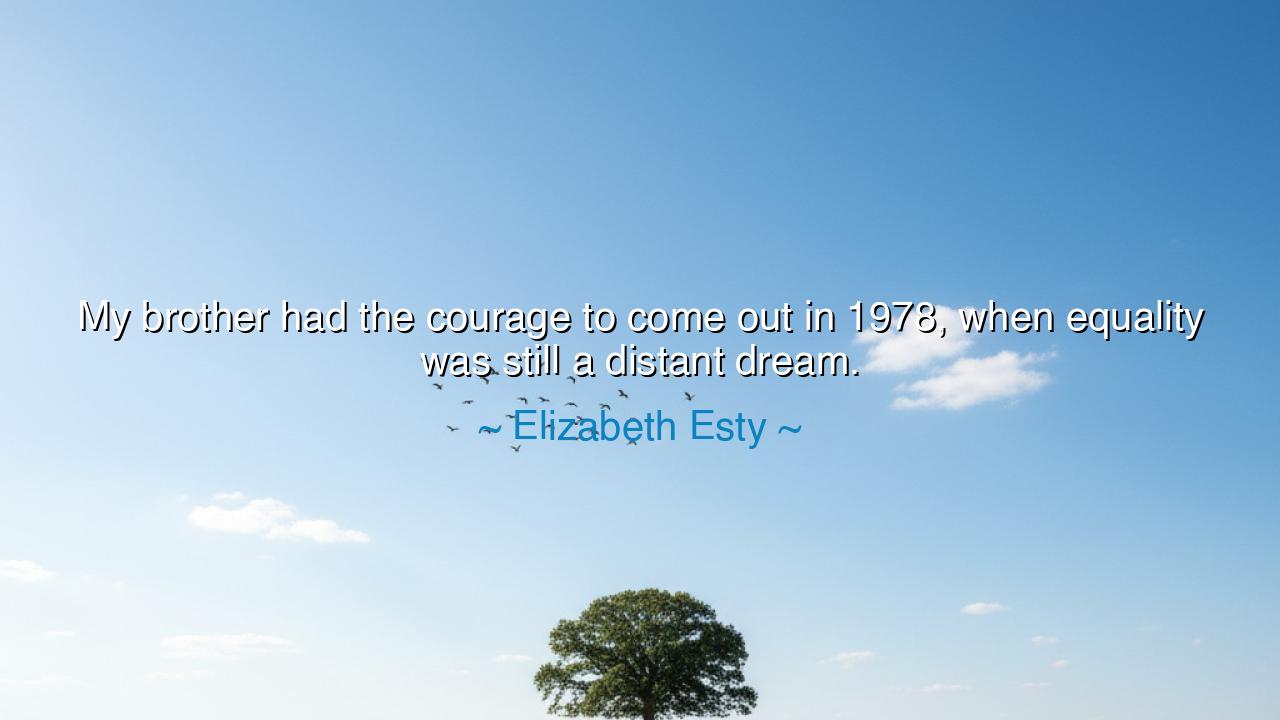
My brother had the courage to come out in 1978, when equality was
My brother had the courage to come out in 1978, when equality was still a distant dream.






In the words of Elizabeth Esty, “My brother had the courage to come out in 1978, when equality was still a distant dream.” These words are a testament not only to her brother’s bravery, but to the long and often painful road of human dignity. To come out in 1978, at a time when society still cloaked love in shame and law condemned what the heart declared true, was to stand unshielded before the storm. It was to proclaim authenticity in an age of silence, to risk rejection in pursuit of truth. Esty honors that act as an emblem of the struggle for equality—a dream that flickered in the distance but had not yet been reached.
The courage her brother displayed was not common, for the cost of honesty was high. In those days, people lost families, friends, careers, and sometimes even their lives for daring to speak their truth. To come out in 1978 was to defy the weight of prejudice, to lift one’s voice above the roar of judgment. It was an act not only for oneself, but for all who would come after—for every voice raised makes it easier for the next to be heard. The ancients would have likened such a step to a warrior’s charge, for it was not taken in safety, but in danger, and yet it opened the path for others to follow.
History offers us powerful mirrors of this truth. In 1969, nearly a decade before Esty’s brother’s declaration, the Stonewall uprising erupted in New York City, when men and women refused to bow before the forces of harassment and injustice. Their defiance marked a turning point, sparking a movement that would grow across nations. Yet by 1978, even with the seeds of progress sown, equality remained far away. Anita Bryant’s infamous campaign against gay rights raged in that very year, and Harvey Milk, the first openly gay elected official in California, was assassinated. To come out then was to walk with heroes and martyrs, and to risk joining their fate.
Esty’s words remind us that movements are carried not only by famous leaders, but by countless unnamed individuals—brothers, sisters, sons, and daughters—whose daily courage helped change the fabric of society. Her brother’s story is the story of thousands who dared to live authentically before the world was ready to accept them. They did not wait for equality to arrive; they lived in defiance of its absence. And in so doing, they brought the dream closer.
The deeper meaning of her words lies in the recognition that courage precedes justice. Laws do not change themselves; they are pushed forward by those who risk everything in the name of truth. Equality does not descend like a gift from the powerful; it is demanded, lived, and embodied by those who will not bow. Her brother’s act in 1978 was not merely personal—it was political, spiritual, and generational. It was a stone cast into the river of history, whose ripples reached far beyond his own life.
The lesson for us is clear: progress is built upon the bravery of those who dare before the time is ripe. We must honor their sacrifices by refusing to grow complacent. For though equality has come closer, the dream is not yet fully realized. Prejudice still lingers, and silence still suffocates too many voices. Each of us must carry forward the torch lit by those who came before, ensuring that no one is forced to hide who they are, or to risk all simply to live openly.
Practical actions follow from this wisdom. Speak with courage in defense of those still marginalized. Celebrate authenticity in your family, your community, and your workplace. Protect the vulnerable, remembering that behind every statistic is a soul who longs to be free. And above all, do not let progress lull you into slumber—for equality, once distant, now demands vigilance to preserve and expand.
Thus, Elizabeth Esty’s words echo like an ancestral teaching. They remind us that every act of truth, no matter how small, moves humanity closer to freedom. Her brother’s courage in 1978 was a seed sown in barren ground, yet it grew into a forest of change. Let us then pass on this wisdom: that the dream of equality, though distant in one age, draws near through the bravery of those who dare to live in truth. And it is our duty, in this generation and the next, to guard that dream until it belongs to all.






AAdministratorAdministrator
Welcome, honored guests. Please leave a comment, we will respond soon